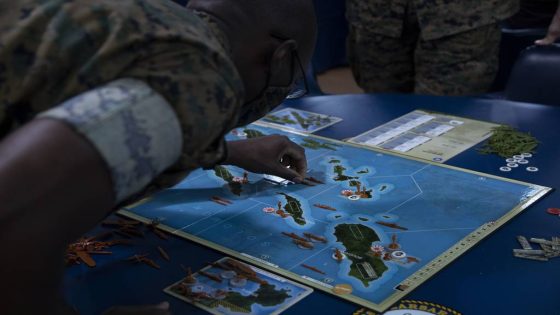The Marines have opened a 100,000-square-foot wargaming center to meet the complex tactical and operational problems the service faces now and in the future.
Dedicated on Friday during a ceremony at Marine Corps Base Quantico, Virginia, the General Robert B. Neller Center for Wargaming and Analysis was named for the 37th commandant, who first announced plans for its creation in 2017.
In 2017, Marine officials said that the center would at least double their wargaming capacity â giving them the ability to conduct 20 wargames annually, including two large-scale, 250-participant exercises.
The former commandant spoke at the dedication ceremony Friday.
âThe Marine Corps has a long history of wargaming from the development of amphibious doctrine up to today when weâve looked at wargaming to test op plans, force generation, force structure. Itâs always been part of what we do,â Neller said.
RELATED
The main mission of the center is to help develop capabilities through rigorous analysis and current intelligence.
Marines also will include science and technology experts to advise on current and future enemy capabilities in scenarios so that wargamers get a clearer picture of how theyâll fight.
The center aims for a more immersive experience than traditional tabletop exercises with advanced graphics, simulation and modeling so players can employ platforms, tactics and concepts and see whether their approaches succeed or fail.
âTime on rehearsal is seldom wasted, and a wargame is a rehearsal,â Neller said. âItâs a test. And you hope you put enough rigor in the test so you can challenge whatever plans or assumptions youâve made.â
âYou never want to just show up. Wargaming will hopefully keep you from just showing up and not being prepared for whatever you might face in the future.â
The $79 million center is the largest of its kind in the Washington, D.C.-area, according to a Marine press release. The centerâs combined military and civilian staff of 183 personnel will build five cross-functional wargame teams that will conduct four wargames apiece each year, according to the release.
The center is expected to reach full capability by 2025, officials said.
Gen. Christopher Mahoney, assistant commandant of the Marine Corps, said during his speech at the dedication, âIn a security environment that has become less certain by the day, (the center) buys us a higher level of certainty. It buys us the chance to make mistakes in an environment where the cost isnât paid in blood by our Marines.â
The facility will contain technology that can integrate joint and coalition assets and teams, running multiple wargames simultaneously at various classification levels.
Those features help provide analysts and planners with more realistic scenarios.
The analysis from such wargames informs how the Corps decides to adjust its manning, structure its formations and acquire or divest various technologies.
Lt. Gen. Karsten Heckl, deputy commandant, Combat Development and Integration, said, âThis is about an enhanced capability that allows our warfighters the opportunity to hash out the challenges of a multi-domain battlefield and become more competent more quickly before going to the training area or actual combat.â
Wargaming featured heavily in a multitude of changes to the Marine Corps under Nellerâs successor, former Commandant Gen. David Berger.
The Force Design changes, which eliminated tanks, military police and cut back on certain conventional artillery and air assets, also shifted the size of infantry battalions and resulted in the creation of a new formation: the Marine littoral regiment.
In the 2022 Force Design update, authors cited âextensive wargaming,â specifically Expeditionary Warrior 21 informed the serviceâs distributed maritime logistical operations concept then under development with the Navy. Another wargame called âEnigmaâ tested concepts for information operations below the level of armed conflict. That same data was used, in part, for the subsequent Marine Corps Doctrinal Publication 8 âInformation.â
âHopefully this center will allow Marines to do more in a sophisticated, more technically advanced setting, and we will be able to learn more about our plans and our ideas and also about each other,â Neller said.
Todd South has written about crime, courts, government and the military for multiple publications since 2004 and was named a 2014 Pulitzer finalist for a co-written project on witness intimidation. Todd is a Marine veteran of the Iraq War.
Source Agencies




